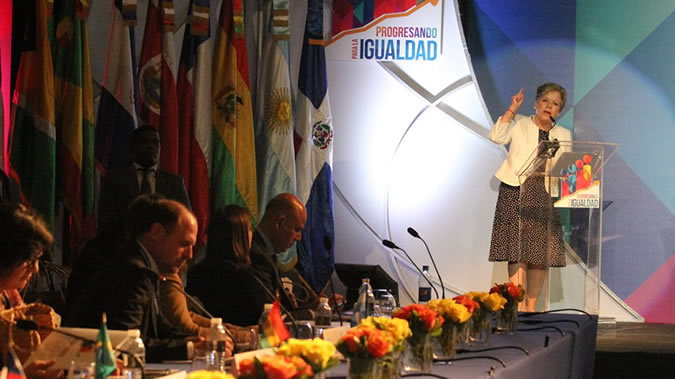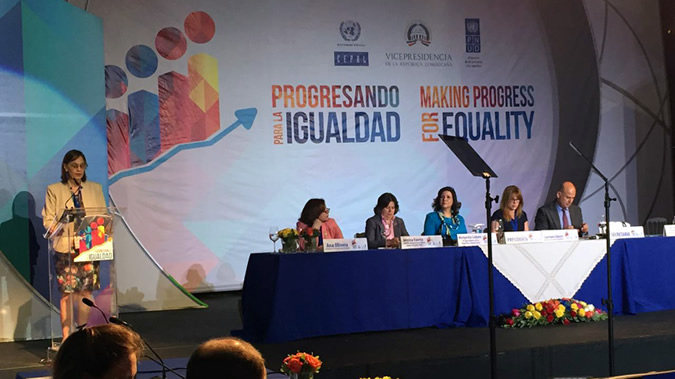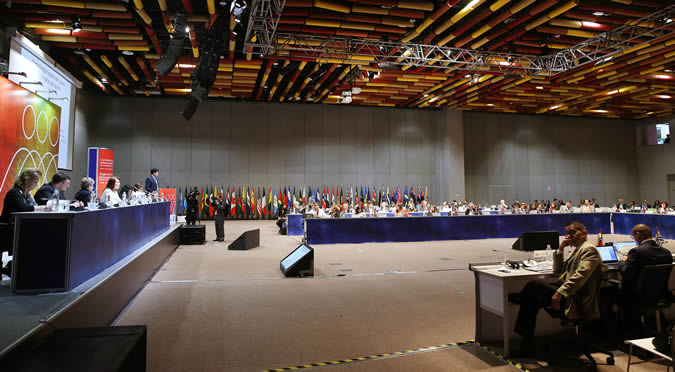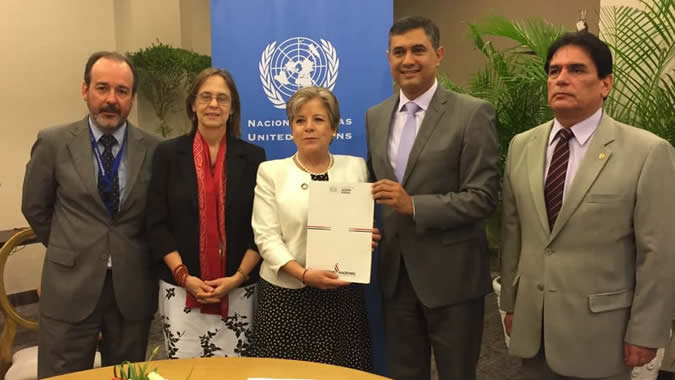Work area(s):
Representatives from 33 countries meet in the VIII Ministerial Forum to rethink possible progress models from a multidimensional approach, in line with the Sustainable Development Goals, and maintain the achievements in social policies in the region.

Governments from Latin America and the Caribbean meet on October 31 and November 1 in Santo Domingo, Dominican Republic, to discuss progress on social policy - particularly in the economy and the environment, which are the main challenges for the implementation of the 2030 Agenda and strategies for a sustainable route out of poverty.
The Ministers and managers of finance, planning, labor and social security authorities of 33 countries of the region began today at the VIII Ministerial Forum for Development in Latin America and the Caribbean.
The Ministerial Forum is an annual meeting, which is being held for the first time in the Dominican Republic, and is organized by the United Nations Development Programme (UNDP) in partnership with the Government and with the support of the Economic Commission for Latin America and the Caribbean (ECLAC). This year it coincides with the first meeting of the Presiding Officers of the Regional Conference on Social Development in Latin America and the Caribbean.
The event was inaugurated by the President of the Dominican Republic, Danilo Medina; Vice President Margarita Cedeño, UNDP Administrator Helen Clark and the Executive Secretary of ECLAC, Alicia Bárcena. In addition, it featured the keynote of Esther Duflo, Professor at Adbul Latif Jameel Poverty Action Lab at the Massachusetts Institute of Technology (MIT).
The Ministerial Forum counts the participation of more than 20 Vice Presidents, Ministers and Deputy Ministers of Argentina, Brazil, Ecuador, Guyana, Haiti, Costa Rica, Honduras and Paraguay, among other countries, who will discuss during two days the course of social policies to respond more effectively to human development and well-being.
Participants will analyze the challenges and opportunities presented by the new Agenda 2030 for Latin America and the Caribbean, considering the multidimensional progress as an approach to address sustainable development.
In her opening remarks, the Dominican Vice President said that holding the event in the country is a recognition of the social policies that have driven the government of President Danilo Medina, while she called for seizing the moment in which Latin America knows its capacity to produce well-being and abundance, and thus strengthen social policies for the benefit of the most vulnerable class.
"Four important issues for the region will be discussed: the multidimensional progress, sustainable strategies to lift countries out of poverty, the matrix of social inequality in the region and the definition of social policies to support the Sustainable Development Goals (SDG )", she said.
She mentioned that the themes chosen for the round tables respond to the main challenges faced by countries in the region in order to create more efficient social policies.
The Vice President noted that poverty is a multidimensional problem that must be tackled from a multidisciplinary perspective, and considered that the paradigm that should guide countries in the region is one that sees economic development as a tool for equality.
"People do better when they have freedoms: freedom to live, to eat, freedom to take care of their health, to educate and develop a life plan", she said.
UNDP Administrator, Helen Clark added that “Latin American and Caribbean countries have witnessed remarkable transformations since the early 2000s. Across the region, between 2003 and 2013, more than 72 million people exited poverty, and close to 94 million joined the middle class. There was also important progress in the fields of gender equality, employment, and environmental sustainability”.
“Recent low economic growth, however, threatens ongoing progress. Persistent inequalities, discrimination, and exclusion, including on the basis of gender and ethnicity, also require policy attention both above and below poverty lines”, she added.
Recent UNDP reports show that rethinking the region’s progress along a multidimensional and holistic perspective is key to preventing millions of Latin Americans from falling back into poverty, she said. This can be avoided through a new generation of public policies that strengthen the four factors that prevent setbacks: social protection, care systems, physical and financial assets and labour skills.
Around the world, countries are embracing the 2030 Agenda by “aligning their national development plans with the SDGs, building capacities to co-ordinate sustainable development efforts across sectors, and to drive coherence across policy areas and between levels of government; and raising public awareness of what needs to be done, building innovative partnerships for action”, concluded Helen Clark.
On Day 1 the first meeting of the Board Meeting of the Regional Conference on Social Development organized by ECLAC will also take place. The regional organization will present the study The social inequality matrix in Latin America, which will be discussed by the Vice President of the Dominican Republic, Margarita Cedeño; the Minister of Development and Social Inclusion (MIDIS) of Peru, Cayetana Aljovín; the Social Development Minister of Chile, Marcos Barraza, and the Deputy Minister of Social Development of Uruguay, Ana Olivera.
As she presented this new analytical tool, the executive secretary of ECLAC, Alicia Bárcena said: "The matrix of social inequality in Latin America is strongly conditioned by its economic and productive matrix, characterized by high structural heterogeneity, so the basic determinant of inequality is the socio-economic status or social class. However, there are other structural axes linked to gender, ethnicity and race, the life cycle and the territory that intertwine and strengthen each other".
Related content:
VIII Foro Ministerial para el Desarrollo en América Latina y el Caribe y la Primera Reunión de la Mesa Directiva de la Conferencia Regional sobre Desarrollo Social de América Latina y el Caribe
Intervención de Alicia Bárcena, Secretaria Ejecutiva de la CEPAL.

Countries of the Region Advocate for Progress on Social Investment in Light of Economic Situation and Inequality Gaps
The Presiding Officers of the Regional Conference on Social Development, a subsidiary body of ECLAC, held its first meeting on November 1 in Santo Domingo.

The Dominican Republic Will Host the First Meeting of the Presiding Officers of the Regional Conference on Social Development
Ministers and senior officials from Latin American and Caribbean countries will gather on November 1 in Santo Domingo.

CEPAL y Gobierno de Paraguay firman convenio de cooperación técnica sobre protección social
Secretaria Ejecutiva del organismo, Alicia Bárcena, y Ministro de Acción Social de Paraguay, Héctor Cárdenas, se reunieron durante foro ministerial que se realiza en República Dominicana.
